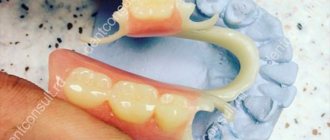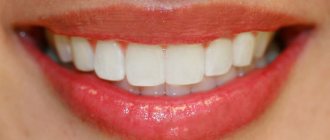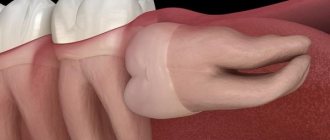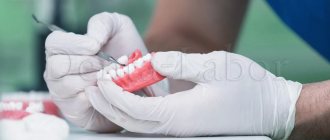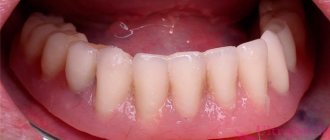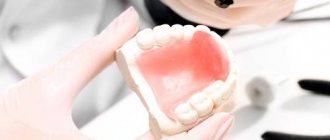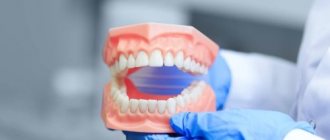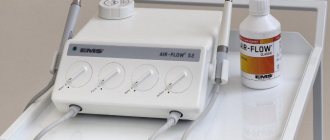Regular care of removable dentures is a necessary measure to maintain a clean oral cavity. After eating, bacterial plaque forms on teeth and orthopedic structures, which causes bad breath and can provoke gum inflammation. To avoid unnecessary problems, you should take care of your dentures daily. Maintaining hygiene will extend their life, prevent the development of dental diseases and help maintain an attractive smile.
Hygienic products for denture care
Caring for orthopedic structures does not take much time. Dentures can be removed, cleaned of dental plaque and rinsed under water after eating. For cleaning, many products are used that help get rid of pigmented plaque and remove harmful microflora.
Toothbrush
For everyday hygiene, use a personal brush with soft bristles. Too hard villi can scratch the surface of the prosthesis, and bacteria will accumulate in microscopic cracks. Cleaning should be done twice a day. Instead of a regular brush, you can use a special double-sided brush, which is designed for caring for orthopedic structures. On one side there is a long working surface, which is designed to clean the outer surface of the product. On the inside there is a short part with rounded bristles that clean the inner surface of the prosthesis well.
Toothpaste
To clean orthopedic devices, it is recommended to use low-abrasive toothpaste. As with the brush, if you use products with a high abrasive content, this can lead to damage to the surface of the structure. Children's toothpastes are considered the most gentle. They gently clean teeth and provide gentle care for dentures. You can also use a therapeutic and prophylactic paste, which contains plant components with an antibacterial effect.
Tooth brush
Standard denture care products can be supplemented with a dental brush, which helps remove dirt from the interdental spaces. Unlike a toothbrush, it has finer bristles that can penetrate even hard-to-reach places. Brushes vary in shape, size, and density of bristles. The vector and principle of their movement during cleansing is similar to a toothpick, however, they are reusable and require washing after the procedure.
Rinse aid
Rinses include special liquids that disinfect the oral cavity and prevent the development of inflammation. They can be used after every meal or sugary drink. During the care process, they clean dentures from food debris, prevent the formation of tartar and freshen breath. Consumers are offered a wide selection of rinses for various purposes:
- anti-caries;
- anti-inflammatory;
- whitening;
- for sensitive gums and teeth;
- combined.
When wearing removable dentures, it is advisable to select products that contain antimicrobial components and prevent the proliferation of pathogenic microorganisms.
Floss
Floss, or dental floss, is used to clean the interdental spaces and the area near the gums. It is made from polymer or natural fibers and comes in small rolls. To clean, you need to cut a small piece of thread, insert it into the gap between the crowns and move it up and down. Regular use of floss helps eliminate plaque, eliminates unpleasant odor, and prevents the creation of a favorable environment for the proliferation of microorganisms.
Irrigator
An irrigator is a device for oral hygiene that performs cleaning by supplying a jet of water under pressure. It can be used to clean both natural teeth and removable orthopedic structures. Most irrigators have two operating modes (“jet” or “shower”), which are selected according to the desired effect. Thus, the “shower” provides general cleaning of the oral cavity and at the same time performs hydromassage of the gums, and the “jet” is used to remove plaque from the interdental space, in the cervical area and other hard-to-reach places.
Citric acid and soda, tablets for cleaning and disinfection
All of the above products are suitable for periodic oral hygiene and removable dentures. They are used as aqueous solutions in which structures are placed for some time. They can also be used as a mouth rinse. Thanks to their antibacterial effect, they effectively remove bacteria and help prevent inflammatory processes. The solution is prepared depending on the chosen product. So, when using citric acid, take one teaspoon of powder and mix with 150 ml of boiled water. The average time for soaking dentures in this solution is 10 minutes.
Final finishing
Thanks to polishing the prosthesis, its surface becomes perfectly smooth, which guarantees the strength, aesthetics and cleanliness of the product.
During polishing, the prosthesis must be held with the index, middle and thumbs. First, the interdental spaces of the prosthetic structure are treated using a conical felt.
Then the entire surface of the product is polished (except for the alveolar processes and the surface facing the hard palate) using a cylindrical felt. The procedure should be performed until a completely smooth surface is formed.
During the entire process, the denture should be moistened from time to time with polishing powder diluted with water.
During treatment with brushes, it is necessary to avoid touching them with the edges of the prosthesis (against the movement of the brushes). Clasps or other metal elements are pre-polished separately.
After processing the base, these elements acquire shine thanks to a thread brush with Goya paste. Prolonged rubbing of the same area should be avoided . To avoid deformation, the product must be periodically moved by hand. It is unacceptable to press the attachments tightly against the prosthesis so that it does not melt.
At the end of the procedure, the structure must be thoroughly washed with warm soapy water using a brush, then dried completely. Polishing is performed at a faster speed than sanding. The harder the material of the product, the faster the speed.
The video shows the stages of polishing a denture.
How to properly clean dentures
Removable dentures require regular cleaning. All rules for their hygiene can be divided into two categories - daily and periodic.
Daily
Daily care includes brushing your teeth in the morning and evening with a soft toothbrush. When cleaning, special attention is paid to the inside of the structure, which is in constant contact with the gums. After eating, the structure should be removed and rinsed under water. Additionally, you can use an irrigator, which thoroughly cleans surfaces and allows you to remove bacterial plaque in hard-to-reach places. When cleaning, care should be taken not to damage the locks, hooks and other elements of the orthopedic structure.
Periodically
Proper care of dentures does not just mean cleaning them from deposits with a brush and irrigator, but also using bactericidal solutions aimed at destroying pathogens. They are used up to three times a week according to the manufacturer's instructions. Additionally, it is recommended to use agents that inhibit bacterial activity. This is especially true several years after the installation of structures, since by this time more deposits have accumulated on them. These products include sprays and lozenges, which not only help fight pathogenic microflora, but also freshen breath and prevent inflammatory processes.
Getting used to the artificial jaw
It will take at least one to two months to get used to the prosthesis. This process is often quite difficult and painful. At the same time, many go through chafing of the structures, and also traditionally experience difficulties chewing and speaking.
There is no way to do this without willpower and perseverance. No matter how difficult it may be, doctors recommend not removing the prosthesis for the first two weeks, even at night. In this case, the patient is advised to “speak it out” by talking and reading aloud, especially in front of a mirror.
In the first month after the installation of the plates, most people turn to their orthodontist regarding the comfort of wearing a denture, and rightly so. The installation of dentures is followed by a painstaking and difficult fitting process. After all, any notch on the devices can provoke the development of many health problems for the patient, and make the process of getting used to it extremely painful.
Wearing dental structures is facilitated by the use of fixing agents (gel, cream, glue, paste, balm, fixing strip). At the same time, the plates fit perfectly and have no gaps between the gums for food crumbs to get in.
Disinfection of the prosthesis
From time to time, dentures should be disinfected, which will clean the surface of harmful bacteria. You can do this in two ways:
- Using disinfectants - special effervescent tablets that are pre-dissolved in water. Such preparations contain substances that help dissolve dental plaque, destroy bacteria and additionally whiten structures. When using tablets, just put the prosthesis in the prepared solution and wait 3 minutes. If necessary, at the end of the procedure, you can use a toothbrush and remove any remaining plaque manually.
- In an ultrasonic bath, the device helps remove bacterial plaque, get rid of unpleasant odors and destroy up to 100% of pathogens. The bath is more expensive than disinfectants, but you can buy it once and no longer spend money on purchasing chemicals.
Hygiene and nutrition
When using a removable product, it is important to properly care for your oral cavity. To protect against various pathologies, it is recommended to perform the following actions:
- Use fixing agents that will prevent damage to the mucous membrane.
- Take topical for impaired salivation
- Visit your dentist if you have gum ulcers. Lack of treatment is dangerous due to atrophy of the jaw bone and thinning of the mucous membrane.
- Be sure to clean the device before going to bed, as salivation decreases during this period.
- Do not rinse with running water rich in microorganisms.
In order not to destroy the prosthesis, it is forbidden to eat apples, carrots, nuts, candies, chewing gum, seeds and crackers. Smoking, drinking strong tea, coffee, colored soda or red wine is highly undesirable.
Rules for storing removable dentures
One of the main rules of wearing removable dentures is that they must be removed at night. It is not advisable to sleep with them, since during sleep there is a possibility of their premature deformation. To store structures, it is better to use a special container that is equipped with a hermetically sealed lid. The protective box must be clean, dry and placed in a place inaccessible to children or pets. If the prosthesis is removed for a long time, it should be placed in a container with a disinfectant solution.
If you follow the recommendations for caring for removable dentures, you can significantly extend their lifespan. Proper oral hygiene will increase the comfort in using orthopedic structures and minimize the risks of complications when wearing them.
Stock
-47%
Dental implant Osstem 35,000 rub.
18500 rub.
get -27 %
Teeth in 1 day on Straumann implants using ProArch technology!
300,000 rub. 220,000 rub.
get -13 %
Metal-free dental crown made of zirconium dioxide 40,000 rub.
35,000 rub.
get -13 %
Removable overdenture on 4 implants RUB 150,000.
130,000 rub. get



